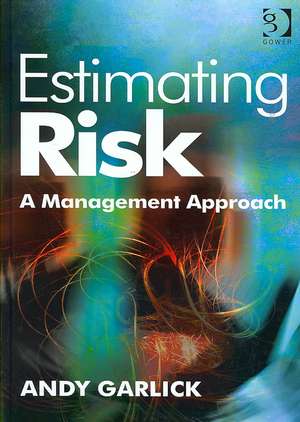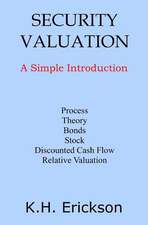Estimating Risk: A Management Approach
Autor Andy Garlicken Limba Engleză Hardback – 28 iun 2007
| Toate formatele și edițiile | Preț | Express |
|---|---|---|
| Paperback (1) | 338.33 lei 6-8 săpt. | |
| Taylor & Francis – 26 oct 2016 | 338.33 lei 6-8 săpt. | |
| Hardback (1) | 767.57 lei 6-8 săpt. | |
| Ashgate Pub Co – 28 iun 2007 | 767.57 lei 6-8 săpt. |
Preț: 767.57 lei
Preț vechi: 1104.76 lei
-31% Nou
Puncte Express: 1151
Preț estimativ în valută:
146.87€ • 160.04$ • 123.76£
146.87€ • 160.04$ • 123.76£
Carte tipărită la comandă
Livrare economică 23 aprilie-07 mai
Preluare comenzi: 021 569.72.76
Specificații
ISBN-13: 9780566087769
ISBN-10: 0566087766
Pagini: 260
Dimensiuni: 174 x 246 x 19 mm
Greutate: 0.64 kg
Ediția:1
Editura: Ashgate Pub Co
Colecția Routledge
Locul publicării:Oxford, United Kingdom
ISBN-10: 0566087766
Pagini: 260
Dimensiuni: 174 x 246 x 19 mm
Greutate: 0.64 kg
Ediția:1
Editura: Ashgate Pub Co
Colecția Routledge
Locul publicării:Oxford, United Kingdom
Public țintă
Professional Practice & DevelopmentCuprins
Contents: Preface. Part One Risk Management Overview: Risk in context; A brief introduction to risk management; Quantitative risk estimates; Using risk models. Part Two Risk Models: Reliability and other binary models; Cost and other additive models; Time and programme; General models. Part Three Decisions and Risk: Public sector decisions; Private sector decisions; Safety decisions. Part Four Techniques: Probability; Monte Carlo; Other methods; Decision analysis. Index.
Notă biografică
Andy Garlick is Managing Director of the independent consultancy, The Risk Agenda (www.riskagenda.com). Andy has twenty five years' experience in risk. This started with work on nuclear risk assessment in the United Kingdom Atomic Energy Authority. Since then he has held senior positions involving the development of a number of risk consulting businesses. He has worked with clients in the nuclear, transport, oil and gas, chemical and government sectors. His mission during this time has been to make risk methods more accessible and more business-focused. He is also a Fellow of the Institute of Risk Management and is currently acting as secretary of their Special Interest group on PFI/PPP.
Recenzii
'A comprehensive and critical overview of the risk management toolkit from both a theoretical and practical perspective. Risk professionals will find it an extremely useful resource. More importantly, it should be required reading for all managers who think they understand how to use the results of a risk assessment to inform business decisions'. Mike Robertson, M.D. Risk Solutions, UK 'Those used to more traditional corporate risk managers will find Garlick's approach refreshing and informative, focusing on how the techniques can be used to help managers manage better rather than on compliance or loss prevention (although of course this remains an important part of any approach to risk). This book provides a very readable insight into the author's approach to risk and will inform both managers and practitioners alike. He has structured his book in a way that allows the reader to understand the subject in simple terms whilst separately providing the mathematical insight (and detail) required for a comprehensive analysis. The book will help managers avoid the many pitfalls in this complex subject and allow them to interrogate the models presented by practitioners and to challenge bad practice when it presents itself. He quite rightly challenges some of the more mechanistic approaches to risk management. Readers of this book will quickly come to understand some of the myths and pitfalls surrounding a reliance on some of the more expensive corporate risk software for estimating risk and I suspect become significantly more demanding of their own risk processes. To use the author's own words - "You have been warned".' Alistair C. Kennedy, Director, Balfour Beatty Management"
Descriere
Andy Garlick's book explores the role of quantitative techniques in modern risk management. It describes a broad range of modelling techniques, all illustrated by business-relevant examples. The role of the models in decision making is also discussed, with particular emphasis on what the risk premium - the price people charge for accepting risk - is and should be. In order to provide a self contained account the underpinning material from probability and decision theory is also included, so that the book will provide a handy reference guide for all practitioners.



















